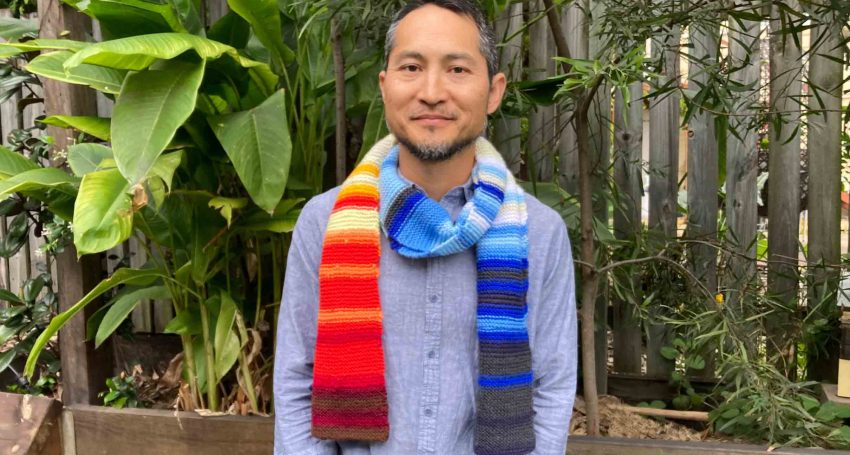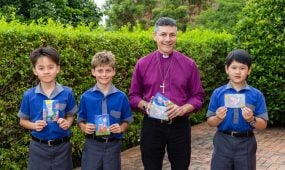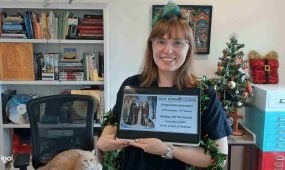Climate scarves, teal independents and proposed treaty
Features
“My friend knitted 100 colourful stripes representing temperatures from the past 100 years – the blue hues represent the years when the Earth was relatively cool; the cream and yellow indicate the years things got a bit warmer; and, the reds represent the years that became very hot,” says the Justice Unit’s Peter Branjerdporn

I first heard about a climate scarf from Cathedral friend Jessica Morthorpe after she presented one to her Member of Parliament to remind them that the Earth’s overall average temperatures are rising and that we all have a responsibility to help re-balance the climate.
My friend knitted 100 colourful stripes representing temperatures from the past 100 years – the blue hues represent the years when the Earth was relatively cool; the cream and yellow indicate the years things got a bit warmer; and, the reds represent the years that became very hot.
Inspired by her action, Christian justice advocacy organisation, Common Grace, started a nation-wide campaign called “Knit For Climate Action” in 2020 to encourage Christians to knit a scarf for their elected representatives and church leaders. They made the pattern available online and my daughter and I signed up to make one for our church to display during the Season of Creation last year.
As it turned out, many other Christians also signed up. By the beginning of 2022 more than 300 scarves had been knitted, which is enough to gift one to every Federal Member of Parliament and Senator! This was a sign that damage to the climate is now an issue that many Christians care deeply about.
A recent Tearfund Australia climate report confirms that 86 per cent of young Christians want effective action taken to re-balance the climate. The report also tells us that three out of every four young Christians think care for creation should be an essential part of the Church’s mission.
The scarves were given to our Federal elected leaders in Canberra late last year, less than a year before the election was called. We know that the outcome of the 2022 election was impacted by the so-called “climate-wars” – overall, average mum and dad voters preferred candidates who were more serious about climate action than party politics. The emergence and success of the “teal” independents are particularly telling, with their trademark colour being a mixture of blue (for the more conservative side of politics) and green (for those who are concerned for the environment). Clearly most people want a safe climate for our children and grandchildren to grow up in.
Advertisement
Now that the new Albanese government has committed to a 43 per cent emissions reduction by 2030, some may feel that the job is done. However, this goal is simply not fast enough to curb the effects of climate change on our planet, as demonstrated in the “Aim High, Go Fast: Why Emissions Need to Plummet this Decade” report published by the Climate Council. It says that:
“…given the scale of the global emissions reduction task, and taking into account Australia’s very high level of emissions and our huge renewable energy resources, Australia should aim to reduce emissions by 75% below 2005 levels by 2030 and reach net zero emissions by 2035. This is a fair and achievable contribution to the global task and an imperative given our high vulnerability to escalating extreme weather.”
So we must continue to challenge our leaders to aim higher.
While elections are great opportunities to send a message to our leaders that we are concerned about the climate, thankfully there are plenty of other opportunities in between. One such opportunity is the upcoming 27th United Nations Framework Convention on Climate Change “Conference of the Parties” (COP27) in Egypt. This conference will be held in November, when support for an international Fossil Fuel Non-Proliferation Treaty will be sought.
Advertisement
The proposed treaty, which has garnered support from senior faith leaders such as former Archbishop of Canterbury Dr Rowan Williams, reflects a growing global concern that the continued production and export of fossil fuels are overpowering any gains made by the nation-by-nation pursuit of emissions reduction targets.
Faith leaders from around Australia and the Pacific, including from the Anglican Church and other traditions, have signed an open letter to the Australian Government in support of the Fossil Fuel Non-Proliferation Treaty. They are also calling for an end to approvals for new coal and gas projects and to public subsidies for coal and gas projects.
On the morning the open letter to the Prime Minister will be published, you can support this growing movement of concerned people of faith by joining the Multi-faith service for climate justice at St John’s Cathedral on Thursday 13 October from 8am to 9.15am.
You can also get involved and make a difference by:
- Following the Queensland Australian Religious Response to Climate Change Facebook Page.
- Signing the Fossil Fuel Non-Proliferation Treaty as a Faith Leader or as a concerned individual.
- Knitting a scarf and giving it as a gift to an elected representative or faith leader or wearing it during the colder months as a conversation starter. Download the Knitter’s handbook and pattern.
Editor’s note: The Justice Unit’s Peter Branjerdporn is coordinating this year’s On Earth Fest, which will be held on Saturday 8 October at St Francis College. Check out the On Earth Festival website and follow On Earth on Facebook. Book online via Eventbrite. General admission tickets are $20. Concession and under 18 years tickets are $10. Children 12 years and under are free.





